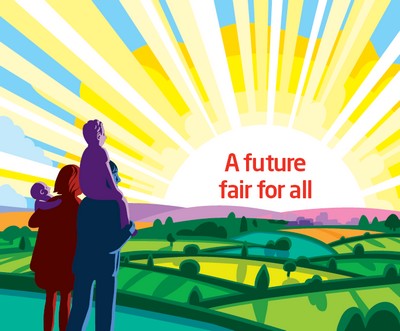917 words | ~5 min
It must, in fairness, be a nightmare writing party election manifestos, knowing that every word will be pored over by journalists, lobbyists, organisations and individuals looking to wring every drop of significance from whatever you commit to paper. Little wonder they're frequently so dry - any misplaced phrase can drop with a resounding clang.
In the run-up to the UK general election, though, the Labour Party has surpassed itself with the innocuous but amusing title of its manifesto. The Conservatives' manifesto (PDF), launched today, dodges most ambiguities and seems decisive by using imperative phrases for most of its section headings - e.g. 'Make politics more accountable', 'Combat climate change' (though it falls at the last hurdle with a section on 'One World Conservatism' which, for me, activates a sense of similarity not with the happy notion of a 'One World' movement but the sinister prospect of 'One World Government').
Labour's manifesto, though, sticks its ambiguity on the front page.

Fans of psycholinguistics will be familiar with the garden path model of sentence processing, which holds that readers parse lexical units (words or compounds) in sentences sequentially, checking for semantic consistency as we go and revising our initial assumptions whenever we find something that confounds them - so we can read and make sense of the phrase Jack gave in and parse 'gave in' as an intransitive phrasal verb in the sense 'surrendered', then revise our reading when our eyes take in the next few words and we read that Jack gave in his homework, and realise that 'gave in' is a transitive verb in the sense 'submitted'. We might then see the word book at the end of the sentence, and then we'd have to re-parse 'homework' as an attributive noun (or an adjective, depending on your point of view) in the compound 'homework book'.
So what's the issue with A future fair for all? One adjunct to the garden path model is the idea of minimal attachment, which proposes that as readers or listeners we assume simple/familiar relationships between words until the evidence forces us to reconsider. So, for example, we find sentences like the horse raced past the barn fell hard to make sense of, and I put the candy on the table in my mouth faintly confusing, because we assume we are reading a sentence about a horse racing past a barn (rather than being raced past a barn and falling) or candy being put on a table (rather than candy already on a table being put in one's mouth).
Minimal attachment errors can also lead us to some odd mental images - such as a table in one's mouth. The community at Language Log christened these baffling sentences 'crash blossoms', and the Crash Blossoms Blog records plenty of examples, mainly from the linguistic pressure-cookers that are newspaper headlines.
A future fair for all seems to be causing its readers some trouble and amusement. While nobody seriously assumes that Gordon Brown is planning a massive funfair at a to-be-specified later date, it's clear that the phrase is being activated in this way for plenty of people, perhaps before its intended meaning - 'a future that is fair for everybody'.
Minimal attachment is to blame. Here's an example of the way a garden-path reader might parse the line.
A future (determiner/article + noun)
A future fair (determiner/article + adjective + noun: future reanalysed)
A future fair for all (determiner/article + adjective + noun + prepositional phrase)
(Note: it's possible to parse a future fair as determiner + noun + adjective, with 'fair' as a postpositive adjective - as in the old hymn which promises believers 'a harp, a home, a mansion fair'. Postpositive adjectives are now fairly uncommon and archaic, though, so this meaning is less likely to be activated.)
It takes another look and a bit of contextual thinking to realise that Labour are not promising a funfair in the future, and that the minimally attached reading is not plausible, even though it is semantically well-formed.
We've been stitched up by a feature of English syntax: the reduced relative clause. This feature allows relative clauses to skip the introductory relative pronoun - so instead of the shoes which are on my feet we can say the shoes on my feet.
This means that we can, without seeming to violate any constraints of English syntax, talk about a future fair for all. It's just that garden-path processing and minimal attachment will mean that what we intend may not be the first meaning that occurs to our readers.
Which, when it comes to canvassing for votes, is not a good thing.


